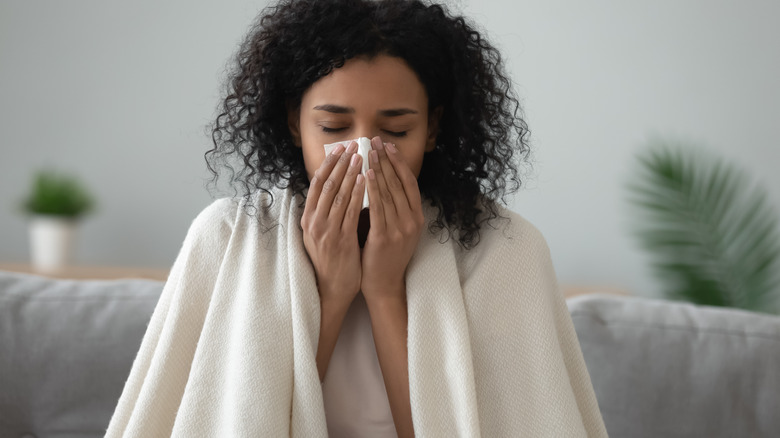Do Mild COVID Symptoms Lead To Long COVID?
Long COVID is a condition linked to the COVID-19 virus, which is characterized by lingering symptoms following recuperation from the virus that can last for an undetermined amount of time, according to the Centers for Disease Control and Prevention (CDC). It has been found that around 20% of people who catch COVID-19 will go on to develop Long COVID, as per the Mayo Clinic. This number bumps up to 25% for those over the age of 65.
While many people recover from the virus and return to their baseline health status, others find that they can't quite beat the fatigue, cough, headaches, and brain fog that mark Long COVID (via CDC). Other common symptoms include stomach aches, discomfort in joints and muscles, difficulty breathing, and heart palpitations. COVID-19 has also been known to affect a range of multi-organ systems, leading to the development of health conditions such as diabetes, blood clots, and heart issues. Unfortunately, Long COVID is still being studied, and there is no cure.
Additionally, there are a few risk factors that make people more susceptible to Long COVID, including pre-existing health conditions and experiencing extreme symptoms from the virus that requires medical care or hospitalization (per the Mayo Clinic). However, even if you've only had mild symptoms from the virus, you can still be at risk for Long COVID. Here's what we know.
Long COVID can affect anyone who has caught COVID-19
Researchers have found that Long COVID is possible even for those who experienced mild symptoms of the virus. The National Institutes of Health defines a mild case of COVID-19 as anyone experiencing indicators such as fever, cough, sore throat, malaise, headache, muscle pain, nausea, vomiting, diarrhea, and loss of taste and smell. The difference, in this case, is that they will not show signs of shortness of breath, dyspnea, or abnormal chest imaging.
Following a 2022 study published in the Journal of the American Medical Association on the prevalence of Long COVID, researchers Sarah Wulf Hanson and Theo Vos published a commentary in The Conversation explaining their findings. "We found that a staggering 90% of people living with long COVID initially experienced only mild illness with COVID-19," they stated. The researchers added, "because the vast majority of COVID-19 cases do not require hospitalization, many more cases of long COVID have arisen from these milder cases despite their lower risk." Furthermore, a whopping one in seven people were found to be afflicted with symptoms of Long COVID even after a year had passed following their infection.
The researchers conclude by acknowledging the need for longer-term and more in-depth studies of the condition to learn more about it and how to deal with it moving forward.


